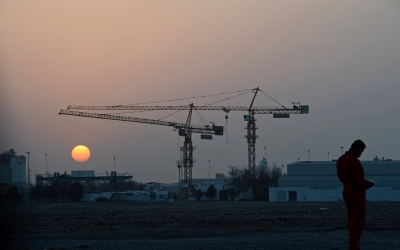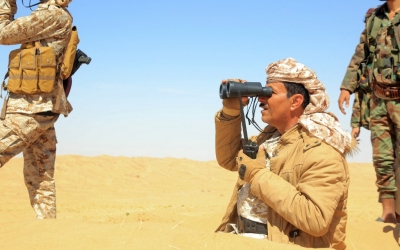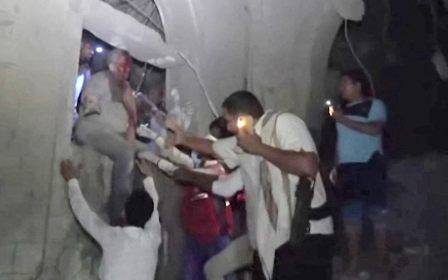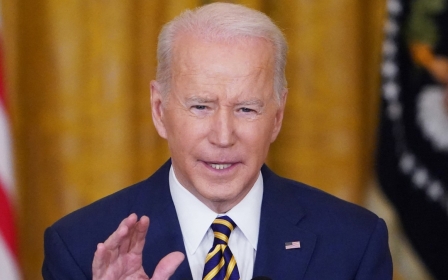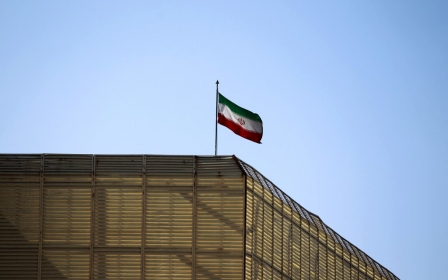Yemen: Houthis tell foreign companies to leave 'unsafe' UAE after deadly bombing
Yemen's rebel Houthis on Friday called on foreign companies to leave the United Arab Emirates (UAE) after the Saudi-led coalition fighting them attacked a detention facility in northern Yemen on Friday, killing at least 100 people, while a second attack shut off the country's internet.
The military coalition, supporting Yemen's internationally recognised government, has intensified air strikes against what it says are Houthi military targets after the Iran-aligned group conducted an unprecedented air assault on the UAE on Monday, as well as launching further cross-border missiles and drones towards Saudi cities. The UAE supports forces fighting the Houthis.
In a tweet posted on Friday evening, Houthi forces spokesperson Brigadier General Yahya Saree wrote: "After the massacres committed... today against our dear people, we advise foreign companies in the UAE to leave, as they are investing in an unsafe state as long as the rulers of this state continue to attack our country."
UAE presidential adviser Anwar Gargash warned earlier this week that the country would exercise its right to defend itself after the 17 January Abu Dhabi attack, which was claimed by the Houthis.
New MEE newsletter: Jerusalem Dispatch
Sign up to get the latest insights and analysis on Israel-Palestine, alongside Turkey Unpacked and other MEE newsletters
"The Emirates have the legal and moral right to defend their lands, population and sovereignty, and will exercise this right to defend themselves and prevent terrorist acts pursued by the Houthi group," he told US special envoy Hans Grundberg, according to the official WAM news agency.
Dubai alone is home to 45 Middle East and Africa headquarters of multinational companies, and more than 21,000 African companies.
'The numbers are going up'
Basheer Omar, a spokesperson for the International Committee of the Red Cross, said numbers were still rising following Friday's dawn attack on the temporary detention centre in Saada, the home city of the Houthi rebel movement.
"There are more than 100 killed and injured... the numbers are going up," said Omar, citing hospital figures.
Ahmed Mahat, the head of mission in Yemen for the medical NGO Medecins Sans Frontieres, called the incident a "horrific act of violence" and said it was "impossible to know how many people have been killed".
"From what I hear from my colleague in Saada, there are many bodies still at the scene of the air strike, many missing people. Al-Gumhourriyeh hospital in the city has so far received around 200 wounded, and they say that they are so overwhelmed that they cannot take any more patients."
Footage released by the Houthis on Friday showed rescue workers pulling bodies from the rubble following the raid on the prison that has been used as a detention centre for migrant workers transiting the war-ravaged country.
Reuters quoted a witness as saying several of those killed were African migrants.
Further south, in Hodeidah, video footage showed bodies amid rubble and dazed survivors after an air attack on a telecommunications hub. Yemen suffered a nationwide internet blackout following the attack, a web monitor said.
A statement from Save the Children said three children were killed in the attack on Hodeidah.
"Yemeni voices are already not heard well enough. So with the internet and telecommunications being down, people will be dying in a slow death while the world doesn't know," Afrah Nasser, a Yemen researcher for Human Rights Watch, told Middle East Eye.
"In legal terms, bombing civilian infrastructure is a war crime. So this is brutal, this is terrible for the civilians, for aid workers, for civilians, for the civil society organisations, for our human rights partners that we work with on the ground. How can we get reports out of Yemen?"
United Nations Secretary-General Antonio Guterres condemned the attack on Saturday, calling for an investigation and accountability.
The Saudi-led coalition on Saturday denied targeting the detention centre, the Saudi official news agency SPA reported.
"The coalition will inform the Office for the Coordination of Humanitarian Affairs in Yemen and the International Committee of the Red Cross on the facts and details," the state news agency said, citing a coalition spokesman.
Civilian harm
The Giants Brigades, Yemeni southern troops backed by the UAE, have suspended their operations in the north after weeks of aiding the Saudi-backed government forces in their battle to capture the southeastern province of Shabwah from the Houthis and advancing into rebel-held areas of Marib to the north.
That advance came to a halt on 11 January, Middle East Eye has learned, when the spokesperson of the Saudi-led coalition, Turki al-Maliki, announced the liberation of three districts in Shabwah.
A Giant Brigades fighter in Shabwah told MEE that the forces halted their operations in Marib after reaching populated areas, as they didn't want to target those areas.
"We received directions to stop advancing, but the main reason behind that was the residential areas we reached," he said. "The Houthis are hidden amid civilians, so if we advance there will be a big loss among civilians. So we stopped."
The war in Yemen erupted in September 2014 when the Houthis seized the capital, Sanaa, sparking a civil war that forced President Abd Rabbuh Mansour Hadi to seek refuge in Aden and then Saudi Arabia.
The kingdom and its allies intervened in March 2015 and have since carried out more than 22,000 air strikes in an effort to roll back the rebels, with one-third striking non-military sites, including schools, factories and hospitals, according to the Yemen Data Project.
The UN has estimated the war had killed 377,000 people by the end of 2021, both directly and indirectly through hunger and disease.
The world body has also declared Yemen the "world's worst humanitarian crisis," as heavy artillery and air strikes have hampered access to health care and increased pressure on the few facilities that are still functioning.
Middle East Eye delivers independent and unrivalled coverage and analysis of the Middle East, North Africa and beyond. To learn more about republishing this content and the associated fees, please fill out this form. More about MEE can be found here.


